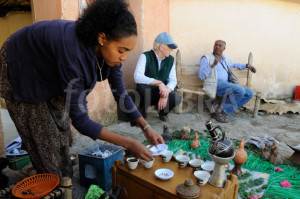Growing up in Tigray, the northernmost state in Ethiopia, Tigrinya was my mother tongue. But Amharic is the second most commonly used language in our area, and is the lingua franca for all the different ethnicities across Ethiopia. It’s also commonly used among Ethiopian immigrants in Seattle.
In some cases, English words and expressions can be too direct for Ethiopians. They can feel tactless, less smooth, awkward, confrontational or lacking in decorum.
And some Amharic words don’t just have an exact equivalent in English, but are so catchy and unique to the language that once you discover them, you want to use them all the time, whether you’re speaking in English, Tigrinya or Korean.
Be advised: in Amharic a lot hinges on your intonation, so some words can range from polite, sarcastic, angry to casual, depending on your delivery.
Without further ado, here are the five essential Amharic words that we severely lack in English:
1. Injah (እንጃ) — ignorance
Injah basically means “I dunno.” But it’s so much more than that. You could always sayahlahwekoom (“I don’t know”) to express ignorance or unawareness, but that may sound too technical or just robotic.
In fact, injah is not derived from the verb ahwokeh (“to know”), and is only used in the first person. It’s is a fascinating word that doesn’t appear to have any grammatical category.
https://youtu.be/jpA1D7vnXt4
Yosef Gebre sings “injah yenen” — “I don’t know my about my fate” because he loved a beautiful woman that everyone wants.
Depending on the context injah can convey various things other than just not knowing:
Tactical denial: Angrily, you ask your suspicious friend, “Where’s the cookies!” You friend softly responds, Inay injah? trying to calm you down.
You can also use inay injah? politely with esteemed adults, e.g. with a priest, or cautiously with authorities e.g the police.
On the other hand, if said with an aggressive intonation, it can express apathy or hostility: Someone annoyingly asks, “Well, I messed this up. What should I do now?” You respond,injah! or inay injah! Note the exclamation mark to show displeasure. In this case, it could mean “I don’t give a rats ass!” or “Don’t ask ME!”
Even more confrontational variations are injalih or injah abatih. If you say these variations with your peers, prepare to exchange punches.
2. Good (ጉድ) — bad omen
In Amharic, good (pronounced “gwood”) actually means “bad” or “weird.”
More precisely, gwood is used to describe a situation that is strange or out of the ordinary. Most of the time these are unfavorable situations, but they can also be simply astonishing, like when you observe a contortionist doing something amazing and seemingly unnatural.
Here is another example: If a five-year old says something really clever in an argument and you don’t have an immediate retort, you simply say gwood! In this case, you are saying “whoa!” slightly admitting defeat, probably ashamed that you were upstaged by a little kid.
Sometimes gwood could have almost the exact same meaning as “weird.” However, it’s commonly used as interjection in spoken Amharic — “weird” can’t capture the versatility of the word.
It can be used in grave situations too. Let’s say a person tells you someone you know has just died. It’s hard to get used to death. So, immediately, all you can muster doing is loudly cry, gwood! gwood! as many times as you think expresses your sadness.

People usually put their hand or hands on the back of their head while saying gwood!Making this gesture without saying the word communicates the same thing.
You can also use it in an exaggerated sense, when the situation isn’t actually so fantastic or unfathomable — for example, if you want to appear shy at suggestive language. For instance, in small towns in Ethiopia, be prepared to receive a unanimous gwood! from the locals if you’re seen kissing with your significant other in public.
These variations have the same meaning, albeit being more intense: Ahyeh gwood! wey(e) gwood! and gwood no!
3. Issey (እሰይ) — cheering fate
This term is used to express extreme satisfaction that something good or bad has happened.
Someone who was lunging to hurt you trips and falls down to the extent they are no longer a threat or are demotivated to pursue their initial plan. You emphatically say: issey!cheering on the instant karma that has struck them down and further dissuading them to never try or do that again.
Be careful when you use issey! to celebrate others’ misfortune. Only say this if you know, even if they are extremely pissed off, they can’t do any harm any more.
“Revenge is best served cold,” as they say. And saying issey! is really cold. So eventually you want to console the unfortunate or at least pretend to care about them!
You can use issey in any situation except death or what can be considered extreme harm.
The second, and perhaps more common use of issey is in favorable situations. See if you can hear Ethiopian Orthodox Tewahedo Church Christian sing issey ahberah mehskehloo, luh-alem hooloo (“Rejoice his cross is lighted, all over the world”)
It can be used in an intensely extreme satisfaction. You can, for example, say issey! to cheer a student for getting a perfect score, immediately after hearing the news. And if you are a woman, you probably want to ululate too (I’ve yet to hear a man ululating). Issey, ililllil is something you say when you’re filled with happiness.
4. Tigahb (ጥጋብ) — overly satisfied
The direct meaning of tigahb is “fullness from eating food.” Tigahb conveys both satisfaction and fullness, while we have whole other word for that sickness and lack of mobility that comes from overeating: “kuntan” (ቁንጣን).
But most often the power of the term tigahb and its derivatives has less to do with food and more with people being spoiled, which we’re all guilty of at one time or another.
Examples: when someone is too proud or cruel to help the needy, believes they are far beyond social expectations or morality, or thinks they are beyond human fallibility. Then you say to them: Tigahbenya, uhra Tigahb, wey Tigahb? inday Tigahb? or Betam Tegbahal!
All these phrases roughly mean either “You’re such a brat!” or “What a spoiled brat!”
This phrase is especially useful in situations when things are going really well for someone but they still can’t stop complaining. (Some Seahawks fans should be hearing this a lot!) Or when they overreact (e.g. when those same ‘hawks fans smash their TV’s after a loss.)
You say this morally rebuking phrases in a tone of utter disbelief that they are acting in a certain way, saying certain things or doing something unbecoming. It’s an offensive way to demand they be humble and stop acting like such jerks.

5. Intin (እንትን) — “the thing”
This is a pretentiously long word for a filler.
Mostly, it’s used to collect your thoughts (like saying “umm…”), to change the subject, or bring a wandering conversation back on topic. It can also be used to request someone’s attention when other options like simah (“listen”) feel too direct.
But be careful! This word is closely related to intinih to refer to a man’s or woman’s “thing” (if you get my meaning).
In Amharic, there are formal and vulgar terms for private parts, but they are rarely used in casual communication. Instead, each household tends to give their own unique names. However, people still commonly use the word intinih and intinish (for female “things”) without naming names, if the context is obvious.
Another handy variation is intinah, which can mean “hey, you.” It’s a neutral way to address a stranger whose name you are not sure about: “intinah, what was your name again?” or “What is intinah saying?” There is just no English equivalent for this important word.
Bonus round: sharp inhaling — “I’m listening”
To “utter” this non-verbal expression you need to inhale the word ‘huh’ instead of just oxygen. It’s like sighing except instead of breathing out, you breath in. You must make it so brief that it’s not perceptible to the naked ear — though your conversation partner might notice the corresponding widening of the eyes and raising of the eyebrows.
This interesting linguistic tool is so subtle many people don’t seem at all aware of using. I was not aware until recently that it even existed, or that I myself was doing it. Now I’m told it can be very confusing to the uninitiated because it can look like an expression of surprise.
In fact, it’s a way to signal comprehension while listening to someone, letting them finish their thoughts or instructions without interruption. It just means “I understand,” “Okay” or “I’m following you.” Watch pop musician Hermon Baraki use it at around 8 minutes into the video below. Don’t worry if you find it too funny, I do too!
https://youtu.be/-elzuIl8XMc

